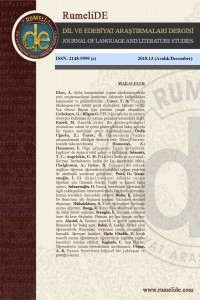Abstract
Cezayirli İngilizce öğrenenlerin en
güçlüklerinden biri, birinci dil (L1) ve İngilizce arasındaki dilbilimsel
farklılıkların cehaletidir. İlk dili Arapça olan ve İngilizce olarak okutulan
öğrenciler, yazılı ve sözlü prodüksiyonlarında çeviri veya yorumlamada mükemmel
olmazlar; Yani, yabancı bir dilde yetkin olmak, ana dile tercüme etme
yeteneğini garanti etmez. Kesin olarak, herhangi bir çeviri / yorumlama
işleminin önceliğinin, karşıt analiz (CA) ve Hata Analizi olduğu, yani, dilleri
zıt ve derinlemesine daha fazla bilişsel derinliğe, dikkati zorlamaya, dikkati
yaymaya ve teşvik etmeye inanıldığı; Öğrencilerin L1-L2 farklılıklarına ilişkin
farkındalıklarını arttırın ve bu farklılıkların bulunduğu alanlarda pratik
yapın. Durumu daha da kötüleştiren şey, Cezayir'de ikinci bir dil olarak
Fransızca'nın, çeviri sürecini hızlandırabilecek veya engelleyebilecek ek bir
dil olarak müdahale edebileceğidir. Bu yazıda, çeviri işleminde CA ve Hata
analizinin önemini belirledikten sonra, dil etkileşiminin çeviri sürecini nasıl
engelleyebileceğini göstereceğiz. Son olarak, öğrenme ve çeviri sürecinin
iyileştirilmesi ile ilgili bazı öneriler ve öneriler bu belgeyi
sonuçlandıracaktır.
References
- Ageron, C.R. 2005. Genèse de l'Algérie Algérienne. Histoire du Maghreb. Vol 2. P. 686 . Asselah-Rahal,S. Le français en Algérie, Mythe ou réalité?. communication proposée lors du IXème sommet de la francophonie, » Ethique et nouvelles technologies: l’appropriation des savoirs en question», les 25 (2001): 8 21. Benhamla, Z. 2009. L’enseignement du français en Algérie: d’une situation linguistique de fait aux querelles de statut.. Published Thesis. Paris 3. Byram, M. (1989).Cultural Studies in Foreign Language Education. Clevedon, England: Multilingual Matters. Cann, R. 1993. Formal Semantics: An Introduction. Cambridge : Cambridge University Press. Debyser, F. 1970. La Linguistique Contrastive et les Interférences. Lfr, 8(1), 31-61. Encyclopedia of Linguistics, Vol. 2, 737-742. Oxford: Pergamon Press. Grandguillaume,G. 1983. Arabisation et Politique Linguistique au Maghreb. l'Université du Michigan. Grishman, R. 1990. Statistical Parsing of Messages. In proceeding of DARPA speech and natural language workshop. Hidden Valley. pp.263-266. Ibrahimi, K. 1997Les Algériens et leur (s) langue (s): éléments pour une approche sociolinguistique de la société algérienne. Éds. El Hikma. Kramsch, K.1998. Language and Culture. Oxford: OUP. Pierrette, B. 1998. Traitement Automatique des Langues Naturelles. De Boeck Supérieur. Pit Corder, S. (1980). Dialectes Idiosyncrasiques et Analyse d'Erreurs. Langages. Vol ; 14(57), 17-28. Ringbom, H. 1994. Contrastive Analysis. In R. E. Asher and J. M. Y. Simpson (eds.), Sorés, A. 2008. Typologie et Linguistique Contrastive. Bern: Peter Lang. Weinreich, U.1953. Languages in Contact. Linguistic Circle of New York.
Abstract
One of the most difficulties Algerian learners of
English encounter is the ignorance of the cross-linguistic differences between
the first language (L1) and English. Students, whose first language is Arabic
and majored in English do not necessarily excel at translation or
interpretation in their written and oral productions; that is to say, being
proficient in a foreign language does not guarantee the ability to translate
into the native language. Accurately, it is widely maintained that what
precedes any act of translation/interpretation is contrastive analysis (CA) and
Error Analysis, i.e. it is believed that contrasting and comparing languages
require greater cognitive depth, force attention, promote noticing; raise the
learners’ awareness of the L1-L2 differences and provide practice in the areas
of these differences. What aggravates the situation is that French as a second
language in Algeria may interfere as an additional language which can boost or hinder
the translation process. In this paper, we will spotlight the importance of CA
and Error analysis in translation, and then illustrating how language
interference can hinder the translation process. Finally, some recommendations
and suggestions about the betterment of learning and translation process will
conclude this paper.
References
- Ageron, C.R. 2005. Genèse de l'Algérie Algérienne. Histoire du Maghreb. Vol 2. P. 686 . Asselah-Rahal,S. Le français en Algérie, Mythe ou réalité?. communication proposée lors du IXème sommet de la francophonie, » Ethique et nouvelles technologies: l’appropriation des savoirs en question», les 25 (2001): 8 21. Benhamla, Z. 2009. L’enseignement du français en Algérie: d’une situation linguistique de fait aux querelles de statut.. Published Thesis. Paris 3. Byram, M. (1989).Cultural Studies in Foreign Language Education. Clevedon, England: Multilingual Matters. Cann, R. 1993. Formal Semantics: An Introduction. Cambridge : Cambridge University Press. Debyser, F. 1970. La Linguistique Contrastive et les Interférences. Lfr, 8(1), 31-61. Encyclopedia of Linguistics, Vol. 2, 737-742. Oxford: Pergamon Press. Grandguillaume,G. 1983. Arabisation et Politique Linguistique au Maghreb. l'Université du Michigan. Grishman, R. 1990. Statistical Parsing of Messages. In proceeding of DARPA speech and natural language workshop. Hidden Valley. pp.263-266. Ibrahimi, K. 1997Les Algériens et leur (s) langue (s): éléments pour une approche sociolinguistique de la société algérienne. Éds. El Hikma. Kramsch, K.1998. Language and Culture. Oxford: OUP. Pierrette, B. 1998. Traitement Automatique des Langues Naturelles. De Boeck Supérieur. Pit Corder, S. (1980). Dialectes Idiosyncrasiques et Analyse d'Erreurs. Langages. Vol ; 14(57), 17-28. Ringbom, H. 1994. Contrastive Analysis. In R. E. Asher and J. M. Y. Simpson (eds.), Sorés, A. 2008. Typologie et Linguistique Contrastive. Bern: Peter Lang. Weinreich, U.1953. Languages in Contact. Linguistic Circle of New York.
Details
| Primary Language | English |
|---|---|
| Journal Section | Turkish language, culture and literature |
| Authors | |
| Publication Date | December 30, 2018 |
| Published in Issue | Year 2018 Issue: 13 |


